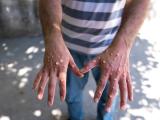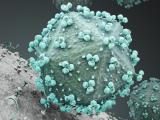The reduction or elimination of funding from the US President's Emergency Plan for AIDS Relief (PEPFAR) could lead to the deaths of nearly 500,000 children in sub-Saharan Africa from AIDS-related causes in the next 5 years, according to an expert policy analysis published today in The Lancet.
Models also predict that another 1 million children will become infected with HIV, and 2.8 million will be orphaned after their parents die of AIDS, the University of Oxford–led research team said.
The team analyzed data from UNAIDS, UNICEF, the World Bank, Violence Against Children Surveys, SPECTRUM model data, and Population-based HIV Impact Assessments, as well as from PEPFAR reports. The researchers also conducted in-depth interviews, searched PubMed for program effectiveness evidence, and reviewed economic reports.
Foreign-aid pauses announced in January
In January, shortly after taking office, US President Donald Trump signed an executive order pausing all foreign aid for 90 days pending a review. PEPFAR has distributed $6.5 billion to fight HIV in 50 countries around the world each year and has been credited with saving more than 26 million lives since its 2003 inception.
In a Lancet news release, co-lead author Lucie Cluver, PhD, of the University of Oxford, said an abrupt withdrawal of funding for PEPFAR programs would turn back global HIV/AIDS progress to the "dark ages" of the epidemic.
"A sudden withdrawal of PEPFAR programmes, especially in the absence of a long term strategy to replace them, could lead to a resurgence of HIV infections and preventable deaths, and a dramatic rise in the number of children orphaned by AIDS in the coming years—a setback that could erode two decades of progress," she said.
PEPFAR's reciprocal benefits
The benefits of PEPFAR aren't limited to African countries, the authors noted, with improved health and national security through reduced forced migration and better odds of containing emerging transborder infectious diseases.
Overall, PEPFAR-supported countries in sub-Saharan Africa have progressively increased their co-financing of their health systems through domestic government and private expenditure from $13.7 billion per year in 2004 to $42.6 billion per year in 2021.
PEPFAR also is a boon to the United States economically, with a fourfold rise in the export of US goods to Africa and the trade of $71.6 billion in goods between the United States and Africa in 2024, the authors noted. And PEPFAR-benefiting African countries have committed to taking responsibility for HIV responses by 2030.
"Overall, PEPFAR-supported countries in sub-Saharan Africa have progressively increased their co-financing of their health systems through domestic government and private expenditure from $13.7 billion per year in 2004 to $42.6 billion per year in 2021," they wrote.
The researchers called for the United States and Africa to work together on accelerating domestic government co-financing, private-sector investments, and charitable foundations. "A 5-year progressive runway of transition can occur through continued authorisation of PEPFAR programmes, which can lead to the end of AIDS for children and families, an historic achievement," they wrote.
The study findings align with those of a study published in the Annals of Internal Medicine in February, which predicted that the cessation of PEPFAR funding would lead to more than half a million new HIV infections in the next 10 years in South Africa.
Feasibility of 5-year plan
An accompanying letter today in The Lancet by 11 senior African health officials describes the feasibility of a 5-year transition plan, highlighting PEPFAR successes such as averting the deaths of 7.8 million pregnant and breastfeeding women who otherwise would have left millions of orphans behind.
The officials' analysis of World Bank Development Indicators also showed progress, with a PEPFAR-catalyzed 212% increase of in-country financial contributions to healthcare in nearly all supported countries, from $13.7 billion in 2004 to $42.6 billion in 2021.
Together, we can end this fight and finish well, making not just the USA and Africa, but indeed the world, safer, stronger, and more prosperous.
"In contrast, domestic funding for health in non-PEPFAR-supported LICs [low-income countries] and LMICs [low- and middle-income countries] in sub-Saharan Africa only increased by 181% during this period, and has remained substantially lower than in PEPFAR-supported countries," the leaders wrote.
A 5-year collaboration between the United States, African governments, private donors, and faith-based organizations could help transfer the vast majority of the responsibility for financing the full integration of HIV services to African countries and institutions. "Together, we can end this fight and finish well, making not just the USA and Africa, but indeed the world, safer, stronger, and more prosperous," they concluded.




















